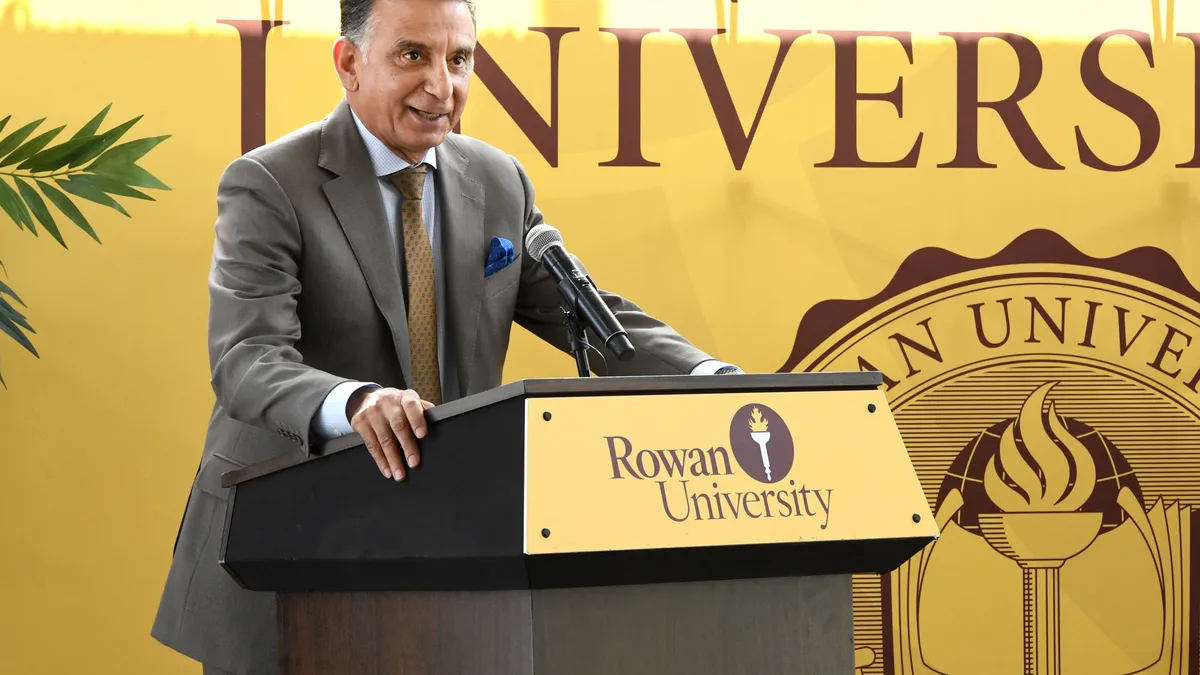Ali Houshmand is worried about the cost of higher education. Specifically, as the president of Rowan University, a public four-year institution in New Jersey, he is concerned that tuition is rising while education is becoming less and less practical.
"Parents are asking questions (about) whether it's actually a good investment for me to send my son or daughter to school" due to the price of a degree and concerns over whether they will be able to find a job in their field, he told Education Dive in an interview.
His charge: "How do I make sure to provide affordable and accessible education to anybody who seeks it?"
To do so, Houshmand and Rowan have focused on initiatives designed to raise the university's profile and give students more ways to learn.
So far, it's working.
Enrollment rose nearly 60% from 2012 to 19,465 students in the fall of 2018. And underrepresented students' share of the student body grew from 15% in 2009 to 30% in 2018. The university has also improved its six-year graduation rates, and its first-time student retention rate is a few percentage points above the national average.
That growth reflects and has been cause for the university's expansion. Since 2012, Rowan has added two medical schools, more than doubled its faculty, stood up 62 academic programs, tripled the value of its annual new gifts and pledges, and continued to help revitalize the city of Glassboro. In 2018, Rowan received Carnegie R2 research classification.
With access in mind, Houshmand also pledged to keep undergraduate tuition growth at or below the rate of inflation. The university cut its annual tuition increases from 7.25% in 2009 to 2.21% in 2020. One year, 2014, saw no increase.

It's personal for him, too. Houshmand has raised more than $30,000 for emergency scholarships by selling his own line of hot sauce. And this fall, Houshmand teamed up with a local brewery to make a beer using the habanero-based sauce, with proceeds funding emergency scholarships.
Those changes have earned the university praise from its accreditor, the Middle States Commission on Higher Education. In a report on its March 2019 evaluation, which the university shared with Education Dive, the accreditor called Rowan "exceptionally innovative, entrepreneurial, and nimble."
In the time since its last full review, in 2009, the university has "undergone remarkable and dramatic positive change," it continued, with "strong, transparent, and stable leadership."
That makes it a "case study for institutional transformation," Middle States wrote.
Houshmand became president of Rowan in 2013 after spending six years in its administration in various roles. During his tenure, but particularly since he took the helm, the university rapidly expanded in Glassboro, throughout the state and online.
He's not finished. In the next decade, Rowan expects to invest $1.2 billion in the university's expansion. But Houshmand says the main campus will stay around its current size, and its accreditation review noted that fast growth could cause capacity issues.
Instead, he's looking off campus.
One approach has been co-branding with two-year institutions. Students can spend two or three years at one of two community colleges and transfer to Rowan to finish their degrees, for a total cost of around $25,000. The move reflects the university's access-oriented mission, Houshmand said.
"Irrespective of their academic background or irrespective of their financial well-being, we believe everybody deserves education," he said.
He has also directed $3 million over three years toward developing programs that address future workforce skills.
And the university is considering a major investment in online education. Rowan's online division, which launched in the fall of 2009 and currently enrolls around 14,000 students, has been a mostly homegrown operation.
But the university is thinking bigger. "We believe we can grow substantially larger than that because we have learned how to do it, we know how to expand," he said.
Those plans are still being ironed out, but an acquisition or a partnership is not out of the question, he said.
Kenneth Hartman, interim vice president of the university's Global Learning and Partnerships division, credits Houshmand's focus on Rowan for its trajectory.
"You can't grow that way unless you bring the institution along with you," he said. "And Ali's done an amazing job of doing just that, in a way that most college presidents would not have the courage to do."




 Read more
Read more





